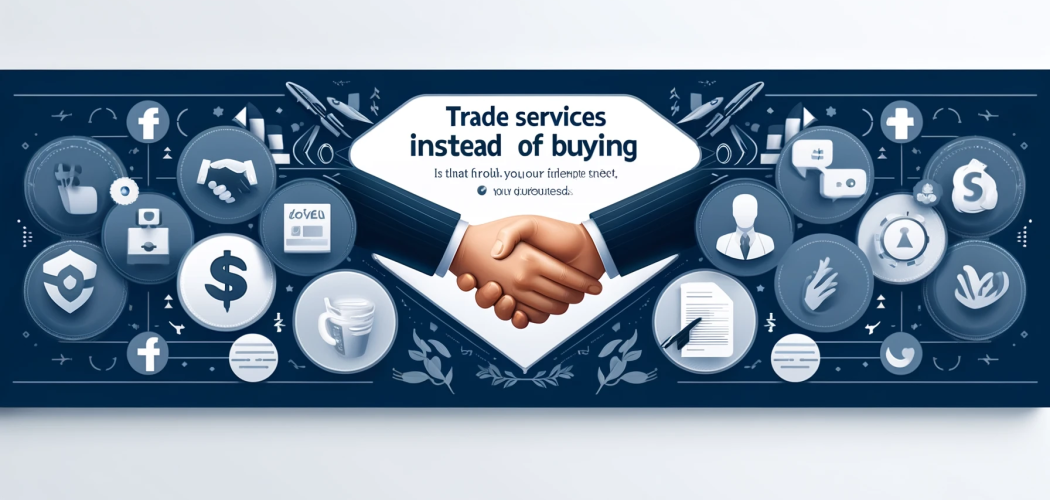
Smart Reasons to Trade Services Instead of Buying
In today's fast-paced business world, companies are constantly looking for ways to save money and increase efficiency. One often overlooked strategy is trading services instead of buying them outright. This approach can offer numerous benefits, especially for freelancers, small businesses, and online agencies. Let's dive into the key reasons why trading services can be a smart move.
Caption: Trading services can help build stronger business relationships.

Table of Contents
- Introduction
- Cost Efficiency
- Building Stronger Relationships
- Access to Specialized Skills
- Real-Life Examples
- Challenges and Solutions
- Conclusion
- FAQs
Introduction
Trading services is an age-old practice that has found new life in today's economy. Instead of purchasing services outright, businesses and individuals can exchange their skills and expertise. This method is particularly advantageous in a digital landscape where online collaborations are the norm. Whether you're a freelancer, an online agency, or a small business, trading services can significantly impact your bottom line.
Cost Efficiency
-
Save Money on Business Expenses
One of the most compelling reasons to trade services is the potential for cost savings. By bartering skills, you avoid the immediate outlay of cash, which can be especially beneficial for businesses operating on tight budgets. For instance, a graphic designer might trade their services with a web developer. Both parties get the help they need without spending money.
-
Optimize Resource Allocation
Trading services allows you to optimize your resources. Instead of stretching your budget thin, you can allocate funds to other critical areas of your business. This flexibility can lead to better financial management and improved overall efficiency.
Caption: Networking and building long-term partnerships through service trading.

Building Stronger Relationships
-
Foster Long-Term Partnerships
When you trade services, you're not just engaging in a transaction; you're building a relationship. This collaborative approach fosters long-term partnerships that can be mutually beneficial. Trust and reliability grow when businesses work closely together, leading to more opportunities for future collaboration.
-
Enhance Networking Opportunities
Bartering services often leads to increased networking opportunities. As you trade services with various professionals, you expand your network, which can be invaluable for future business prospects. These relationships can open doors to new clients, referrals, and partnerships.
Access to Specialized Skills
-
Tap into Expert Knowledge
Trading services gives you access to specialized skills and expertise that might otherwise be out of reach. For example, a content writer could trade their writing services for SEO expertise from a digital marketing professional. This exchange ensures both parties benefit from skills they don't possess in-house.
-
Boost Business Capabilities
By leveraging the skills of others, you can enhance your business capabilities without hiring additional staff. This approach is particularly useful for small businesses and startups that need to stay lean and agile. Access to a broader skill set can lead to higher-quality outputs and more innovative solutions.
Caption: Freelancers collaborating on a project by trading services.

Real-Life Examples
-
Example 1: Web Development and Graphic Design
A small web development firm needed graphic design services but didn't have the budget to hire a designer. They traded their web development skills with a freelance graphic designer. Both parties benefited: the developer got the design services they needed, and the designer received a professional website in return.
-
Example 2: Content Writing and SEO
A freelance writer and an SEO specialist decided to trade services. The writer provided high-quality content, while the SEO specialist optimized the writer's website. This trade improved the writer's online visibility and helped the SEO specialist build a portfolio of well-written, optimized content.
-
Challenges and Solutions
Identifying Suitable Partners
One challenge of trading services is finding suitable partners. It's essential to identify businesses or professionals whose skills complement your needs. Networking events, online forums, and professional networks can be great places to find potential partners.
-
Establishing Fair Value
Determining the fair value of traded services can be tricky. Both parties must agree on the value of the services exchanged to ensure a fair trade. Clear communication and written agreements can help avoid misunderstandings and ensure a smooth exchange.
Conclusion
Trading services instead of buying them outright offers numerous benefits, including cost savings, stronger relationships, and access to specialized skills. By leveraging the strengths of others, businesses can enhance their capabilities and foster long-term partnerships. As the digital economy continues to grow, the practice of trading services is likely to become even more prevalent.
Call To Action
If you found this article useful, don't forget to share it with your network!
FAQs
- What are the main benefits of trading services?
Trading services can save money, build stronger relationships, and provide access to specialized skills.
- How can I find suitable partners for trading services?
Networking events, online forums, and professional networks are great places to find potential partners.
- What should be included in a service trading agreement?
A clear description of the services exchanged, the value of each service, and the terms of the agreement should be included.
- Can trading services help small businesses grow?
Yes, trading services can help small businesses access skills and expertise without the financial burden of hiring additional staff.
- What are some common challenges in trading services?
Identifying suitable partners and establishing fair value for services are common challenges.
- How can I ensure a fair trade when exchanging services?
Clear communication, written agreements, and mutual understanding of the value of services can help ensure a fair trade.
.png)